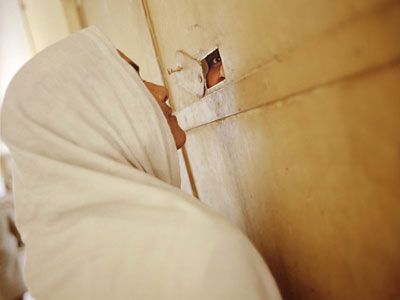Prisons: “the most critical area of human rights in a civilised society”
10th December 2013

Today – Human Rights Day (10 December 2013) – is a chance for organisations around the world to draw attention to both the continuing violations of peoples’ rights and the positive steps being made in protecting and respecting them. So it is appropriate that today PRI is in Kolkata, India, conducting a training of trainers’ workshop on human rights and prison management to prison officials from the Eastern States of India.
The training is part of a project, supported by the UK Foreign and Commonwealth Office, working with the Regional Institutes of Correctional Administration to train prison officials on human rights and prison management in order to improve the conditions and treatment of prisoners. In addition to the training, a seminar will take place on Friday 12 December to discuss how legislation and policy in line with international human rights standards can be properly established and implemented in these states.
To mark the day, we asked three members of the PRI-sponsored training team what human rights in prison means to them and what they see as the biggest challenges for criminal justice and penal reform in their country.
Dr Rani Dhavan Shankardass, Secretary-General of Penal Reform and Justice Association (PRAJA), Gurgaon, India and Honorary President of PRI.
“In societies like India’s where the day-to-day problems of the vast majority are backbreaking and heart-breaking, the idea that society should worry about the human rights of prisoners who have supposedly committed crimes is regarded as outrageous. The biggest challenge is to get up and convince the general public that prisoners do not stop being human beings when they enter prisons. Treating them as human beings is all that human rights in prisons are all about. Sounds simple but it ends up as a rather complex issue.”
Dr Riaz Ahmed, Director of the Academy of Prisons and Correctional Administration in Vellore, South India
“As a Correctional Officer, human rights in prisons mean a lot to me because I believe that:
- Prisons constitute the most critical area of human rights in a civilised society.
- In many countries, prison conditions blatantly infringe upon the basic human rights of prisoners.
- The treatment of prisoners is one of the tests of civilisation of a country. By maintaining the human rights of prisoners, we contribute towards the positive development of civilisation.
- No person is born criminal. By restoring human rights to prisoners, the society corrects its own failures by ensuring proper justice for resocialisation of prisoners.
- Prisoners are sent to prison as a punishment and not for punishment. Any deprivation of human rights other than curtailment of liberty constitutes additional punishment which the law does not prescribe.
For these reasons, human rights are a legitimate concern of every prison officer.
The main challenges to ensuring the human rights of prisoners in India are:
- Foremost is overcrowding due to an excessive number of untried/unconvicted prisoners.
- A lack of proper infrastructure in prisons to implement UN standards.
- An over-emphasis on security in prisons.
- The lack of proper training facilities for prison officers.
- The ratio between staff and prisoners is high, leading to staff being overburdened.
- A lack of adequate measures for development of correctional officers.
- A lack of adequate alternatives to imprisonment at pre-trial stage, sentencing stage and post-sentencing stage.
- A lack of adequate resources, and …
- A lack of concern on the part of policy-makers.”
John Podmore, Former Prison Governor and Inspector of Prisons, United Kingdom
“Pope John Paul II said: ‘Prisons should not be a corrupting experience, a place of idleness or vice, but instead a place of redemption’. I like to think that in my 25-year career I have aspired to that vision and the principle that people should go to prison as punishment and not for punishment.
Central to these beliefs is the protection of the human rights of those we incarcerate. If we do not treat people with humanity, dignity, respect and according to the law then we eschew the civilised society we have a duty to pursue.
The greatest challenge to human rights for prisoners in the UK is the ever increasing rate of incarceration resulting from punitive sentencing and risk aversion in release. The more overcrowded a prison system the more the increasingly limited resources will be concentrated on basic incarceration rather than fair treatment.
There is clear evidence (in Scandinavia) that decarceration, and the active pursuit of a policy which only locks up those for whom it is absolutely necessary, can bring about a penal system where human rights and decent treatment prevail as the rule rather than the exception.”
Further information
In August 2013, Riaz Ahmed and John Podmore were in conversation on the BBC World Service for one of a series of short programmes about prisons in an age of austerity. You can listen here.